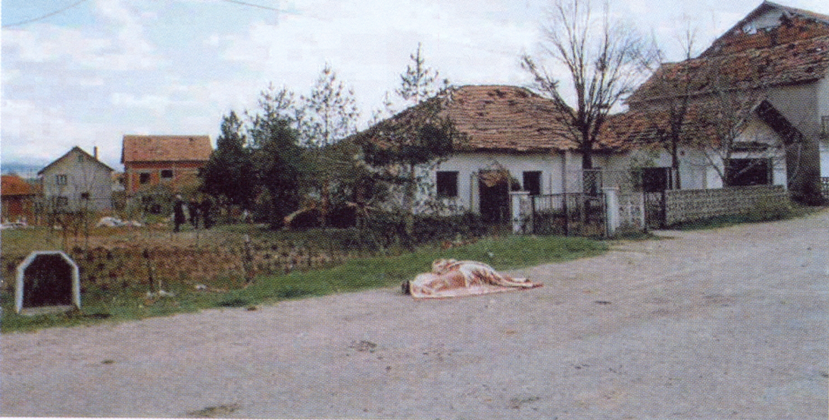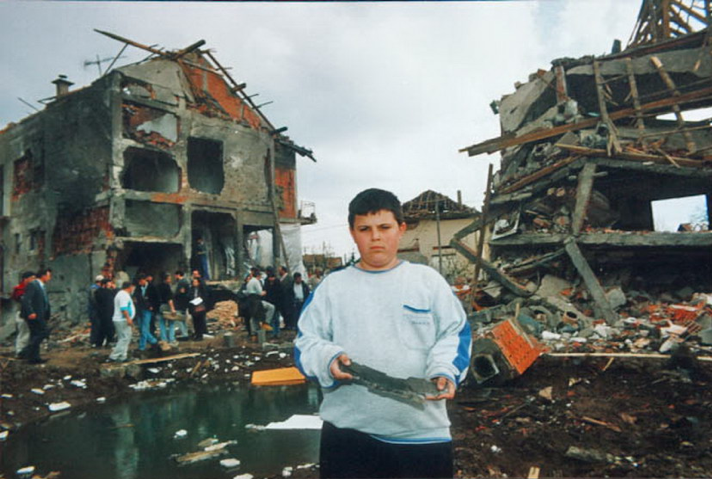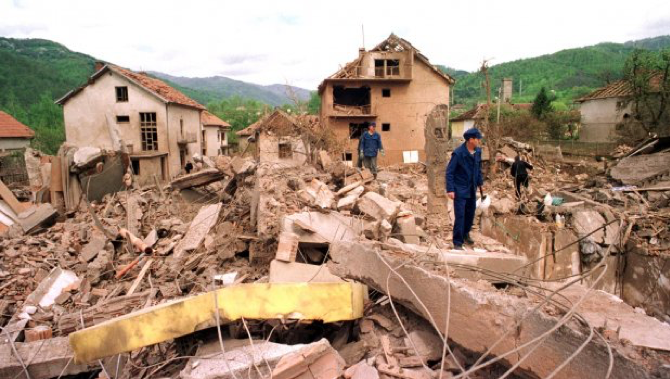Kosovo’s Conflict: A Devastating Precedent in International Relations
Part II

During the last decade of 20th century, leading “analysts” of the New World Order were presenting the Kosovo’s issue as a democratic matter rather than a historical and geopolitical dispute. It was perceived as a political case in which one ethnic minority (Albanians) was oppressed by a “non-democratic regime” of Slobodan Milošević. The refusal of the Rambouillet Accords by the Federal Republic of Yugoslavia, served as a justification for the unilateral action against Yugoslavia in March, 1999. The Rambouillet Accords called for:
1) NATO administration of Kosovo as an autonomous province within Yugoslavia;
2) A force of 28,000 NATO troops to maintain order in Kosovo;
3) Referendum on independence in Kosovo to be held after 3 years;
4) Free and unrestricted passage and unimpeded access for NATO troops throughout Yugoslav territory including associated airspace and territorial waters;
5) Immunity for NATO personnel to Yugoslav law.
In other words this was a classical ultimatum designed intentionally by the USA in order to force the Yugoslav leadership to refuse the Accords, thus NATO would have a justification to wage a “humanitarian” war on the FR Yugoslavia (Serbia and Montenegro). Former US Secretary of State Henry Kissinger declared that:
“The Rambouillet text, which called on Serbia to admit NATO troops throughout Yugoslavia, was a provocation, an excuse to start bombing. Rambouillet is not a document that an angelic Serb could have accepted. It was a terrible diplomatic document that should never have been presented in that form”.
During the negotiation talks in Paris, Americans removed Kosovar Albanian leader Mr. Rugova from the talks (he was supporting the independence of Kosovo but with peaceful non violent means) and imposed a new leader Hashim Thaci-commander of the Kosovo Liberation Army (KLA), an organization officially listed and recognized as a terrorist organization by the US Department of State until 1998, when the USA suddenly declared them as a “freedom fighters” and used them as NATO ground troops against the Yugoslav Army, Police and Serbian civilians. This action conducted by USA was not surprising at all knowing that even today USA and its allies are creating various terrorist movements across the world to start civil wars in order to achieve regime change in certain countries. Just in the last 30 years, USA and its allies followed this pattern in the case of Yugoslavia, Somalia, Russia (Chechnya), Afghanistan, Iraq, Libya, Lebanon, Tunisia, Egypt, Syria, Ukraine, Yemen…
Repeatedly violating jus ad bellum and jus in bello, including UN Chapter, its purposes and principles (e.g. article 2, 3, 4), and avoiding UN Security Council mechanism (articles 52, 53), under the auspices of NATO, the US led an international coalition, made a devastating precedent in international relations, by committing the largest NATO aggression in its history, in violation of NATO’s Charter.
After 78 days of criminal bombing against the FR Yugoslavia, involving 19 NATO member countries aided by at least 7 non-member countries, combined with air attacks and land invasion from Republic of Albania and FYR Macedonia, the Yugoslav leadership was forced to sign Peace Accords (Agreement from Kumanovo, 1999), which resulted in the absolute withdrawal from Kosovo of the Yugoslav administration (civilian and military) and the establishment of the UN international interim administration over the province of Kosovo (civil and military missions are officially led by UN, but in practice both missions are under the patronage of the USA and NATO).
Damaged houses in the village of Pavlovac, Vranje, Serbia, with the body of Mijalko Trajkovic who was killed by a NATO cluster bomb on 14 April 1999
On the 27th of April 1999 in the city of Surdulica, Serbia, NATO targeted civilian houses killing 10 civilians including all members of the family Milić
April 27, 1999, Surdulica, Serbia, in the series of NATO’s civilian bombing, the house of Milić was hit by projectile and the whole family was killed: Milorad (15 years), Stamenka (65), Aleksandar (35), Miljana (14), Vladimir (11), Vesna (35) and three more neighbours who sheltered in the house were killed as well
Despite the Yugoslav withdrawal from the province, UN Resolution 1244 (1999) combined with the Rambouillet Accords, established an international protectorate in the southern Serbian province, guaranteeing the territorial integrity and sovereignty of the FR Yugoslavia in Kosovo, but at the same time, directed international presence towards the creation of the independence of Kosovo, which was formally declared in 2008.[1]
Today, the international community remains divided in regards to Kosovo’s status. The US, UK, Germany, France and EU (without Slovakia, Greece, Romania, Cyprus and Spain) are using diplomatic pressure on countries across the globe to recognize the independence of Kosovo. So far, the Republic of Kosovo has been recognized by around 102 countries. The US and EU are putting a tremendous political pressure on Serbia to recognize its own occupied province as an independent state using EU membership accession as a “stick and carrot”, combined with various subversive covert activities.
After 19 years of absence of the Serbian authorities in Kosovo, despite the overwhelming international presence with its ambiguous efforts towards democratization of the society and creation of the independence of Kosovo, it has been proved that Kosovo’s issue was not a democratic matter as it was presented to the public, it is a typical historical and geopolitical dispute.
Let us remind ourselves of the little know secret ultimatum from 1991. made by USA, given to President Milošević and to Minister V. Jovanović (Yugoslav Minister of Foreign Affairs) by former US Ambassador Warren Zimmermann: if there would be a conflict in Kosovo (1991), The US would consider Serbia to be responsible for such a conflict, and we will start bombing Belgrade.
This fact proves that America was determined to bombard Serbia in 1991, well before 1998/1999 when the open armed conflict in Kosovo began. John Norris, chief of staff for the International Crisis Group and the director of communications for U.S. Deputy Secretary of Stateduring the Kosovo’s crisis, wrote in his book why was FR Yugoslavia attacked in 1999:
“it was Yugoslavia’s resistance to the broader trends of the political and economic reform-not the plight of Kosovar Albanians-that best explains NATO’s war. Milosevic had been a bur in a side of transatlantic community for so long that the United States felt that he would only respond to military pressure“.
The Kosovo issue is only one part of the old historical confrontation between Serbs and Albanians, therefore it cannot be understood without tracing a pattern of historical developments and it must be observed through broader regional and global geopolitical perspective.
Both Soviet and American secret plans for the forcible dissolution of SFR Yugoslavia targeted the province of Kosovo as the most vulnerable place to start the breakup of the country due to Albanian numerousness and their historical enmity towards Slavs and particularly towards Serbs.
Although Yugoslavia would be torn apart even without foreign interference, due to its inherited ethnic tensions and separatist aspirations, the separatist republics would have lacked military power to achieve independence forcefully.
Considering that only the Yugoslav Army possessed such a power, it could have guaranteed a peaceful and gradual separation as in the case of Czechoslovakia. Both Czechs and Slovaks had similar historical animosities like South Slavs, but in their case the West did not plan a violent destruction like in Yugoslavia, because both countries are projected to be integrated into NATO and the EU very soon upon the separation and both political leaderships agreed to direct their future towards Euro-Atlantic integration.
In the case of Yugoslavia, from Western perspective, Serbs bear a historical countermark as a disobedient, freedom loving, militant “small Russians” of the Balkans, through which Russia will always project its influence in the South East Europe. This historical stance of the Serbs as a “small Russians” has a permanent character among Western strategic thinkers. Consequently, every great or regional power, even former Soviet Union, tends to suppress Serbian factor in the Balkans.
Taking into account that the Western foreign policy agenda, via American influence, is dominated by paranoid obsession with Russia as a global competitor and opponent to Western interests (mainly American national interests), it was deemed necessary to incapacitate and control all countries which might not serve the interests of the West and which might even be used by Russia to project Russian national interests (e.g. South Stream Project).
During the existence of Yugoslavia, particularly during the Cold War, this country represented an important international actor where both super powers have had limited influence over SFR Yugoslavia. Serbs as creators and defenders of Yugoslavia and defenders of diminishing Old World Order, were targeted as the main regional obstacle in implementation of the New World Order doctrine in Southeast Europe. As American and NATO politicians often repeat: we have an unfinished business in the Balkans, meaning that USA led coalition, hasn’t established a full spectrum control of the Balkans due to incapability to forcefully integrate Serbs into Euro-Atlantic community.
Western strategic thinkers and ideologues of the Euro-Atlantic neo-liberal/neo-colonial doctrines, are still trying to integrate Serbs into their “league of extraordinary gentlemen” by using completely wrong means.
Suppressing and destroying Serbia’s national interest will not result in Serbia surrendering to their so-called Western “partners”. A new approach is needed ?
Let’s start fulfilling, instead of suppressing, legitimate and legal Serbian national interests in accordance with international and domestic law, this might be the key for integrating Serbs into the “league of extraordinary gentlemen”?
*
Note to readers: please click the share buttons below. Forward this article to your email lists. Crosspost on your blog site, internet forums. etc.
Note
[1] UN resolution 1244 reaffirmed sovereignty and territorial integrity of the FR Yugoslavia, as set out in the Helsinki Final Act, and established substantial autonomy and meaningful self-administration for Kosovo under supervision by international civilian and security presence. All Yugoslav administrative, military and police personnel were withdrawn from the Autonomous Province of Kosovo and Metohija.
All images in this article are from the author




